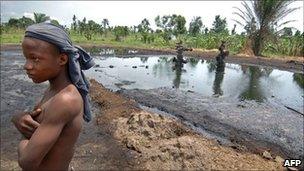Nigeria Ogoniland oil clean-up 'could take 30 years'
- Published

Nigeria's Ogoniland region could take 30 years to recover fully from the damage caused by years of oil spills, a long-awaited UN report says.
The study says complete restoration could entail the world's "most wide-ranging and long-term oil clean-up".
Communities faced a severe health risk, with some families drinking water with high levels of carcinogens, it said.
Oil giant Shell has accepted liability for two spills and said all oil spills were bad for Nigeria and the company.
"We will continue working with our partners in Nigeria, including the government, to solve these problems and on the next steps to help clean up Ogoniland," Mutiu Sunmonu, managing director of the Shell Petroleum Development Company of Nigeria (SPDC), said in a statement.
The Bodo fishing community has said it will seek hundreds of millions of dollars in compensation.
Nigeria is one of the world's major oil producers.
'900 times recommended levels'
The UN assessment of Ogoniland, which lies in the Niger Delta, said 50 years of oil operations in the region had "penetrated further and deeper than many had supposed".
"In at least 10 Ogoni communities where drinking water is contaminated with high levels of hydrocarbons, public health is seriously threatened," the UN Environmental Programme (Unep) said in a statement.
Some areas which appeared unaffected were actually "severely contaminated" underground, Unep said.
In one community, the report says, families were drinking from wells which were contaminated with benzene, a known carcinogen, at 900 times recommended levels.
It said scientists at the site, which lay close to a Nigerian National Petroleum Company pipeline, found oil slicks eight centimetres thick floating on the water.
This was reportedly due to an oil spill more than six years ago, it said.
The report, based on examinations of some 200 locations over 14 months, said Shell had created public health and safety issues by failing to apply its own procedures in the control and maintenance of oilfield infrastructure.
But it also said local people were sabotaging pipelines in order to steal oil.
The report says that restoring the region could cost $1bn (£613m) and take 25-30 years to complete.
"The environmental restoration of Ogoniland could prove to be the world's most wide-ranging and long term oil clean-up exercise ever undertaken if contaminated drinking water, land, creeks and important ecosystems such as mangroves are to be brought back to full, productive health," Unep said.
'Not attributing blame'
The report, which is regarded as the most detailed study on any area in the oil-rich Niger Delta, was paid for in part by Shell after a request by the Nigerian government.
Amnesty International, which has campaigned on the issue, said the report proved Shell was responsible for the pollution.
"This report proves Shell has had a terrible impact in Nigeria, but has got away with denying it for decades, falsely claiming they work to best international standards," said Audrey Gaughran, Amnesty's global issues director, said.
But earlier, Unep spokesman Nick Nuttal told the BBC's Network Africa that the study was not intended to "blame any particular stakeholder operating in Ogoniland".
He also stressed that Shell's admission of liability for two spills had nothing to do with the Unep report.
Shell said on Wednesday that it took responsibility for the spills, which took place in 2008 and 2009, and would settle the case under Nigerian law. The Bodo fishing community had alleged that the leaks had ruined their environment and livelihoods.
In response to Thursday's report, Mr Sunmonu said it made a "contribution towards improving understanding of the issue of oil spills in Ogoniland".
"All oil spills are bad - bad for local communities, bad for the environment, bad for Nigeria and bad for SPDC," he said.
"We clean up all spills from our facilities, whatever the cause, and restore the land to its original state," he said.
The SPDC managing director also urged the authorities to do all they could do curb illegal refining and the sabotaging of pipelines.
Ogoni communities have long complained about the damage to their communities, but they say they have mostly been ignored.
The issue was highlighted by the writer Ken Saro-Wiwa, who was executed in 1995 by Nigeria's military government, sparking international condemnation.
The campaign forced Shell to stop pumping oil out of Ogoniland but it continues to operate pipelines in the region and spills have continued.
- Published3 August 2011
- Published23 July 2010
- Published15 June 2010
- Published9 June 2009
- Published5 June 2008
- Published28 July 2023